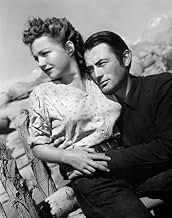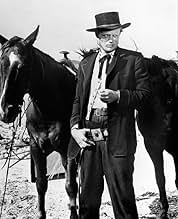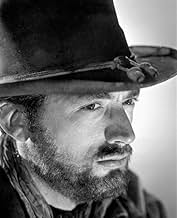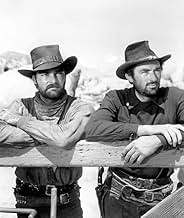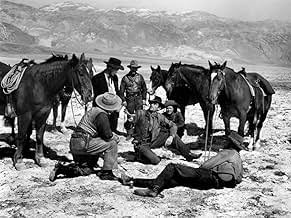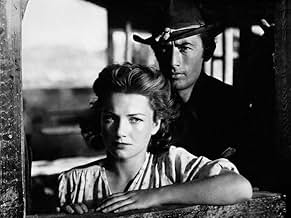NOTE IMDb
7,4/10
6,2 k
MA NOTE
Un garçon manqué et son grand-père découvrent qu'un groupe de bandits se réfugient dans la ville fantôme voisine.Un garçon manqué et son grand-père découvrent qu'un groupe de bandits se réfugient dans la ville fantôme voisine.Un garçon manqué et son grand-père découvrent qu'un groupe de bandits se réfugient dans la ville fantôme voisine.
- Réalisation
- Scénario
- Casting principal
- Récompenses
- 5 victoires au total
Harry Morgan
- Half Pint
- (as Henry Morgan)
Carlos Acosta
- Indian
- (non crédité)
Robert Adler
- Jed
- (non crédité)
Ray Beltram
- Indian
- (non crédité)
Harry Carter
- Cavalry Lieutenant
- (non crédité)
William Gould
- Banker
- (non crédité)
Eula Guy
- Woman Bank Customer
- (non crédité)
Paul Hurst
- Drunk
- (non crédité)
Victor Kilian
- Bartender
- (non crédité)
Norman Leavitt
- Bank Teller
- (non crédité)
Jay Silverheels
- Indian
- (non crédité)
Avis à la une
It's interesting that when it comes to Westerns, most people don't think of Gregory Peck--even though he's made some of the very best films of the genre. Sure he made a lot of other types of films, but this film, THE GUNFIGHTER and THE BIG COUNTRY are absolutely top-notch films.
This film is odd in that Peck is the lead but he isn't exactly a hero. In fact, when the movie begins he's running with a gang of slimy desperadoes. However, through the course of the film, his character changes--revealing SOME decency underneath all that filth. However, despite this change, his character is still very believable and compelling--not preachy or one-dimensional. As a result, this is more of a "thinking person's" film--not just some cardboard characters fighting it out in the middle of the town (something that almost NEVER happened in the Old West). So, take my advice and see this film. The acting, direction and especially the writing make this a must-see Western,...even if you don't particularly like Westerns!
UPDATE: I just saw a remake of "Yellow Sky" called "The Jackals". Instead of the old west, it's set in South Africa and is also quite good.
This film is odd in that Peck is the lead but he isn't exactly a hero. In fact, when the movie begins he's running with a gang of slimy desperadoes. However, through the course of the film, his character changes--revealing SOME decency underneath all that filth. However, despite this change, his character is still very believable and compelling--not preachy or one-dimensional. As a result, this is more of a "thinking person's" film--not just some cardboard characters fighting it out in the middle of the town (something that almost NEVER happened in the Old West). So, take my advice and see this film. The acting, direction and especially the writing make this a must-see Western,...even if you don't particularly like Westerns!
UPDATE: I just saw a remake of "Yellow Sky" called "The Jackals". Instead of the old west, it's set in South Africa and is also quite good.
Some westerns don't allow people to change, or reform, during its run on the screen. "Yellow Sky" allows peoples' true natures to emerge, once the influence of a gold strike in a near-empty ghost town appears. Filmed in b&w in 1948, the film stars a youthful Gregory Peck, a starlet named Anne Baxter, and a superb villainous performance by Richard Widmark.
The story begins with the band of outlaws, led by Peck, hold up a town and escape the clutches of the law by fleeing to the desert sands. They can't go back, because the legal authorities will capture them, and they have to continue to cross the flats, with an ever-dwindling water supply. One outlaw, in fact, filled his canteen with whiskey in the town they held up, and now he's begging to swap a belt of whiskey for just one sip of cool water.
Finally, just before giving up all hope, the band comes to a town called Yellow Sky, which once prospered, but now has all but expired. The two remaining occupants of the town, Anne Baxter and her grandfather, agree to let them rest, spend a few days, and that's when the outlaw band, or rather, Widmark, figures out that the two have a gold strike in the mountains nearby. Why else would they stay in a town going nowhere? Peck wishes to split the gold claim with the two occupants, while the rest of the gang, spurred on by Widmark, desires the whole cache, and if Peck doesn't agree, then they can fix that problem, too. The final shootout in the ghostly buildings of Yellow Sky resolves the conflict.
Look for good supporting performances from John Russell and Harry Morgan, as two outlaw gang members, and providing comic relief is Charles Kemper, whose career in the movies came to an end just a few years after this film was released. He plays the whiskey-guzzling Walrus to the hilt, and some film viewers would wish he had left more film roles on the screen. Overall feelings, a solid 8/10, and happy to see the release of this western classic on DVD.
The story begins with the band of outlaws, led by Peck, hold up a town and escape the clutches of the law by fleeing to the desert sands. They can't go back, because the legal authorities will capture them, and they have to continue to cross the flats, with an ever-dwindling water supply. One outlaw, in fact, filled his canteen with whiskey in the town they held up, and now he's begging to swap a belt of whiskey for just one sip of cool water.
Finally, just before giving up all hope, the band comes to a town called Yellow Sky, which once prospered, but now has all but expired. The two remaining occupants of the town, Anne Baxter and her grandfather, agree to let them rest, spend a few days, and that's when the outlaw band, or rather, Widmark, figures out that the two have a gold strike in the mountains nearby. Why else would they stay in a town going nowhere? Peck wishes to split the gold claim with the two occupants, while the rest of the gang, spurred on by Widmark, desires the whole cache, and if Peck doesn't agree, then they can fix that problem, too. The final shootout in the ghostly buildings of Yellow Sky resolves the conflict.
Look for good supporting performances from John Russell and Harry Morgan, as two outlaw gang members, and providing comic relief is Charles Kemper, whose career in the movies came to an end just a few years after this film was released. He plays the whiskey-guzzling Walrus to the hilt, and some film viewers would wish he had left more film roles on the screen. Overall feelings, a solid 8/10, and happy to see the release of this western classic on DVD.
Yellow Sky is an excellent western, especially to a western buff like me. Along with a top-notch cast, fabulous lighting and great cinematography, I truly enjoyed picking out the locations, most of which were from the Inyo County area of California. Due to my passion for mining in my free time, I was able to spot the Alabama Hills (where the set of the town was located) and the Dunes north of Panamint Springs as two of the locales from the film. Action sequences were well done. The plot, though predictable, has interesting twists, especially those involving Peck and Sheridan. Peck's character is also interesting in that it follows more along the lines of John Wayne's character in the Searchers, someone hardened to life who finally comes around to his humanity. I first encountered this film about a week ago on AMC. I do not know if it is availible on VHS or DVD. If someone could let me know if it is availible in these formats, I would appreciate it. All in all, a great film!
This fine, moody Western was one of a handful of efforts – heralded, incidentally, by the same director’s THE OX-BOW INCIDENT (1943) – which elevated the form and led the genre into its most popular (and prolific) era.
Superbly shot in crisp black-and-white by Joe MacDonald, the film makes the most of its stark location (Death Valley) and terse plot – following a robbery, a band of outlaws eludes the pursuing posse by crossing the desert and finally hitting the titular ghost town (where the only inhabitants are a grizzled prospector and his tomboyish, gun-toting half-breed niece). The cast is headed by relatively new stars of the era – Gregory Peck (in only his second Western), Anne Baxter (she had just won a Supporting Oscar for THE RAZOR’S EDGE [1946]) and Richard Widmark (this was his first of many genre outings, having only debuted a year previously) – which allowed an agreeably fresh and remarkably mature outlook on familiar themes (a small group of people fighting the elements, and themselves over lust and greed).
Though Widmark is surprisingly off-screen for long periods of time (and, consequently, tends to be overshadowed by his co-stars), this still emerges as perhaps the most satisfying among the Westerns he appeared in. For the record, he would play variations on his role here in both GARDEN OF EVIL (1954) and THE LAW AND JAKE WADE (1958); incidentally, I have two more Westerns of his lined up for this week – the former among them (see below) – as part of my tribute to the recently deceased actor. With YELLOW SKY, Peck followed his roguish turn in DUEL IN THE SUN (1946): the character is eventually revealed to be an upstanding person – an intrinsic part of the star’s on-screen persona, which he could play against effectively but did so only occasionally – forced into a life of crime by circumstances. Naturally, the gang subsequently turns on Peck for not wanting to keep all the gold to themselves – and he holes himself up in Baxter and her grandfather’s house, under siege from his former companions! Baxter, then, has been raised in a tough environment where she can practically overcome any obstacle despite her young age and sex: in fact, even more than the outlaws’ intrusion on the life she knew and the property that was rightfully hers, Baxter fears her personal reaction to them (finding herself especially drawn to Peck, who arouses her dormant feminine instincts!).
The film was adapted by Lamar Trotti (who also produced) from a novel by W.R. Burnett, an author more usually associated with gangster/noir pictures and, in fact, as can also be seen from the colorful character names here – Stretch (Peck), Dude (Widmark), Lengthy (dastardly John Russell), Half-Pint (diminutive Henry Morgan), the youthful Bull-Run, the cheerfully heavy-set Walrus, etc. – the narrative could very easily be tailored to that particular milieu. That said, when it was actually remade – in 1967 under the title THE JACKALS, and atypically featuring horror icon Vincent Price in the role of the prospector (by the way, I’ll be watching this version presently since I came across it as a rental) – it retained the Western ambiance, albeit with a difference (which I’ll discuss in that film’s own review).
At the end of the day, I’d say that YELLOW SKY is pretty much essential fare (beautifully handled by the practiced and versatile Wellman – highlighted by a three-way shoot-out which audaciously takes place in a darkened bar-room, and off-screen to boot!). Even so, the film seems to me to be relatively undervalued within the pantheon of the genre itself: for instance, it doesn’t rate as highly as Peck’s three most prestigious Western titles (the afore-mentioned “super production” DUEL IN THE SUN – elaborate, garish but overpowering, the no less grandiose and star-studded THE BIG COUNTRY [1958], and the intimate but psychologically-dense THE GUNFIGHTER [1950] – of which a second viewing is truly in order!).
Superbly shot in crisp black-and-white by Joe MacDonald, the film makes the most of its stark location (Death Valley) and terse plot – following a robbery, a band of outlaws eludes the pursuing posse by crossing the desert and finally hitting the titular ghost town (where the only inhabitants are a grizzled prospector and his tomboyish, gun-toting half-breed niece). The cast is headed by relatively new stars of the era – Gregory Peck (in only his second Western), Anne Baxter (she had just won a Supporting Oscar for THE RAZOR’S EDGE [1946]) and Richard Widmark (this was his first of many genre outings, having only debuted a year previously) – which allowed an agreeably fresh and remarkably mature outlook on familiar themes (a small group of people fighting the elements, and themselves over lust and greed).
Though Widmark is surprisingly off-screen for long periods of time (and, consequently, tends to be overshadowed by his co-stars), this still emerges as perhaps the most satisfying among the Westerns he appeared in. For the record, he would play variations on his role here in both GARDEN OF EVIL (1954) and THE LAW AND JAKE WADE (1958); incidentally, I have two more Westerns of his lined up for this week – the former among them (see below) – as part of my tribute to the recently deceased actor. With YELLOW SKY, Peck followed his roguish turn in DUEL IN THE SUN (1946): the character is eventually revealed to be an upstanding person – an intrinsic part of the star’s on-screen persona, which he could play against effectively but did so only occasionally – forced into a life of crime by circumstances. Naturally, the gang subsequently turns on Peck for not wanting to keep all the gold to themselves – and he holes himself up in Baxter and her grandfather’s house, under siege from his former companions! Baxter, then, has been raised in a tough environment where she can practically overcome any obstacle despite her young age and sex: in fact, even more than the outlaws’ intrusion on the life she knew and the property that was rightfully hers, Baxter fears her personal reaction to them (finding herself especially drawn to Peck, who arouses her dormant feminine instincts!).
The film was adapted by Lamar Trotti (who also produced) from a novel by W.R. Burnett, an author more usually associated with gangster/noir pictures and, in fact, as can also be seen from the colorful character names here – Stretch (Peck), Dude (Widmark), Lengthy (dastardly John Russell), Half-Pint (diminutive Henry Morgan), the youthful Bull-Run, the cheerfully heavy-set Walrus, etc. – the narrative could very easily be tailored to that particular milieu. That said, when it was actually remade – in 1967 under the title THE JACKALS, and atypically featuring horror icon Vincent Price in the role of the prospector (by the way, I’ll be watching this version presently since I came across it as a rental) – it retained the Western ambiance, albeit with a difference (which I’ll discuss in that film’s own review).
At the end of the day, I’d say that YELLOW SKY is pretty much essential fare (beautifully handled by the practiced and versatile Wellman – highlighted by a three-way shoot-out which audaciously takes place in a darkened bar-room, and off-screen to boot!). Even so, the film seems to me to be relatively undervalued within the pantheon of the genre itself: for instance, it doesn’t rate as highly as Peck’s three most prestigious Western titles (the afore-mentioned “super production” DUEL IN THE SUN – elaborate, garish but overpowering, the no less grandiose and star-studded THE BIG COUNTRY [1958], and the intimate but psychologically-dense THE GUNFIGHTER [1950] – of which a second viewing is truly in order!).
This western has adventure, romance, passion, and a very heartwarming ending. The stars, Gregory Peck and Anne Baxter, have great chemistry and their acting is just wonderful. Anne Baxter is feisty and really shines in this movie. Although the movie is over half a century old, it is nonetheless very entertaining and delivers on all fronts.
Le saviez-vous
- AnecdotesDuring filming, Gregory Peck broke his ankle in three places after falling from his horse.
- GaffesJust before beginning to cross the salt flats after the bank robbery, Dude pulls his saddle stirrup out to jump into it, but misses. The scene cuts immediately to another view, showing him successfully mounting the horse.
- Citations
James 'Stretch' Dawson: I ain't talkin to hear my voice. I'm ordering ya.
- Crédits fousOpening credits prologue: The West - 1867
- ConnexionsFeatured in L'étrange incident (1943)
Meilleurs choix
Connectez-vous pour évaluer et suivre la liste de favoris afin de recevoir des recommandations personnalisées
- How long is Yellow Sky?Alimenté par Alexa
Détails
Box-office
- Montant brut aux États-Unis et au Canada
- 5 600 000 $US
- Durée
- 1h 38min(98 min)
- Couleur
- Rapport de forme
- 1.37 : 1
Contribuer à cette page
Suggérer une modification ou ajouter du contenu manquant



